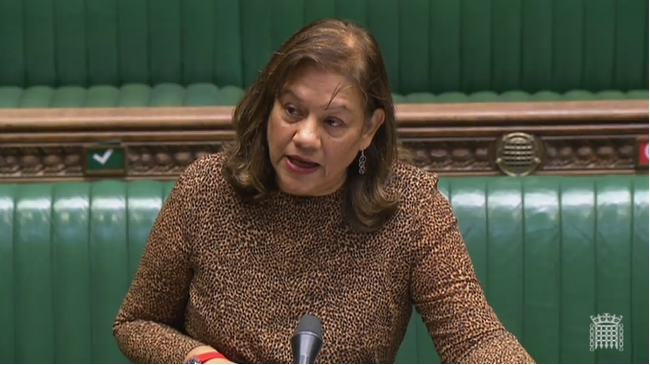- 22/10/2020
- Posted by: Valerie Vaz MP
- Category: News

Responding to the Business Statement on Thursday 22 October 2020, I called for fair and consistent economic support for areas affected by the coronavirus lockdown. You can read my full speech below:
“I thank the Leader of the House for the business next week and for the motion extending proxy voting until 21 March. I do not know whether he has heard the outcome of the Public Health England visit, but I say again that the voting queues are not safe. On Monday, as we were walking round and round, it felt like something out of the book “One Day in the Life of Ivan Denisovich”. We want remote voting because it is safest for Members and, most importantly, for staff, and it is quickest for staff behind the scenes.
The Leader of the House continually talks about democracy and “Erskine May”, but he is excluding Members from taking part in debate at this really difficult time, because some of them are in tier 3 areas that are in lockdown. Will he please reconsider remote voting? It is just for the pandemic, not for life. He will know that proxy votes do not count as a quorum for private Members’ Bills on Friday. We know that more than 25% of Members have proxy votes. I wonder whether he could consider, perhaps through the usual channels, a fairer way of enabling Members to take part via a proxy, so that those votes are not wasted.
Again, there is no update from the Foreign Secretary on Nazanin, Anousheh and Luke Symons, even though Iran is now in its third lockdown and other countries are having some success.
They came for our public money and wasted it. The Government have already spent £12 billion on Test and Trace, and yet they have accounted for only £4 billion, with the private sector consultants being paid £7,000 a day and everyone saying that this is a failed Test and Trace programme. The worst thing is that the Care Quality Commission has been told that its inspectors cannot have weekly testing when they go into care homes. That is one of the most important jobs that needs to be done at this time. Could we have a debate on the whole Test and Trace programme? Who is getting the money? Let it be laid bare. It is difficult to get answers from the Government. Even if we table written questions, the responses are taking a long time to come back. The Government need to be accountable for public money during this pandemic.
Then they came for the Labour Mayors. The Government are now dictatorially moving areas from one tier into another. The Mayor of Greater Manchester has brought everybody together. The Conservative leader of Bolton Council, the hon. Member for Bolton West (Chris Green), who has resigned as a Parliamentary Private Secretary, and the hon. Member for Altrincham and Sale West (Sir Graham Brady)—a really serious person who has been in the House for a long time and is chair of the 1922 committee—have all said that they want to do the best for their community in Greater Manchester. On Tuesday, in response to the hon. Member for Hazel Grove (Mr Wragg), the Secretary of State for Health and Social Care said:
“the cases were shooting up before we took action and then levelled off.”—[Official Report, 20 October 2020; Vol. 682, c. 1032.]
It would be nice to know what figures he is using. If cases are levelling off, why are the Government taking this action?
Let us look at the facts. Liverpool city region has received £44 million; that is £29 per person. Lancashire has received £42 million; that is £28 per person. After three months of restrictions, Greater Manchester was offered—by text—£22 million; that is £8 per head. Will the Government publish the funding formula behind those decisions? The shadow Chancellor, my hon. Friend the Member for Oxford East (Anneliese Dodds), has called it a “phantom” formula.
Then they came for the trade unions. The union learning fund is about to be abolished, at such an important time. It was established in 1988, in the time of Margaret Thatcher. It is one of the most successful learning, training and reskilling projects currently running in British industry. It is value for money. For every £1 invested, there is a return of £12.30, with £7.60 going to the worker taking part and £4.70 going to the employer. The Trades Union Congress said that it contributes £1.4 billion to the economy at a cost of £12 million. Can we have an urgent statement on that decision or a reversal of it?
Yesterday marked the 54th anniversary of the Aberfan disaster when 116 children and 28 adults lost their lives. There was a one-minute silence on Wednesday at 9.15. We must remember them.
Our thoughts are also with my hon. Friend the Member for Bolton South East (Yasmin Qureshi), who is in hospital after testing positive for covid-19. We wish her well, as we do my hon. Friend the Member for City of Chester (Christian Matheson), who is an assiduous attender in the Chamber, and all other Members who may not have said that they have got covid.
Yesterday, the deputy leader of the Labour party, despite grieving for her aunt, Anne Irwin, who died of coronavirus last week, came to the Chamber and said:
“I come here wanting the Government…to succeed, because lives literally depend on it.”—[Official Report, 21 October 2020; Vol. 682, c. 1081.]
We say that there is another way: Labour in Wales’s two-week circuit break and £300 million package, just as was done in New Zealand. The Prime Minister of New Zealand memorably said that the tooth fairy was an essential worker, and we congratulate Jacinda Ardern and Labour party on their historic landslide victory. As they in New Zealand, “Mihi.”


